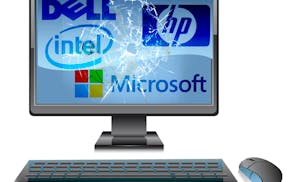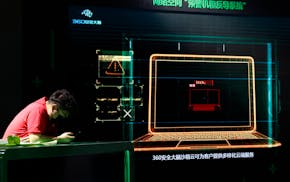Q: I'm worried that my Dell PC's 320-gigabyte hard drive is running out of storage space. I keep getting warnings that nearly all of "backup/recovery E:" capacity has been used up; only 2.57 megabytes remain out of 14.6 gigabytes.
I can't afford a new laptop. Should I move files to an external drive to free up space?
Marilyn Grantham, St. Paul
A: Your PC isn't running out of hard disk space. Some data is in the wrong place and needs to be moved.
Here's what happened. Dell "partitioned" your PC hard drive into three segments that are electronically walled off from each other. There's the "C" drive, which contains more than 90 percent of the 320 gigabytes. It stores most programs and data. Then there's the "D" or "E" drive, a 14.6 gigabyte segment that contains Windows recovery software. And there's a "Dellutility" segment that contains about 100 megabytes of diagnostic software.
Some of your data that should have been stored on the C drive was instead stored on the E drive, nearly filling it up. You need to copy that data to another location, such as an external hard drive, then delete it from the E drive.
Use Windows Explorer to open your E drive. Copy, then delete, all files except the following vital files that must be left alone: $RECYCLE BIN$ (may not be visible because it's a "hidden file"); Dell; Program Files; Program Data (may not be visible); Sources; System Volume Information (may not be visible); Tools; Users; Windows. Once you delete the other files on E, your PC should operate normally. If you've deleted any programs, reinstall them on your C drive. You can move data from the external drive to the C drive as needed.
Q: My Toshiba external hard drive abruptly stopped working. No PC I connected to the drive could read it, and for a while I got the message that there was no data on the drive. Because there are pictures on the drive that I can't replace, I took it to a local repair shop, where I was told they could read the data on the drive for me. I didn't take them up on it, and now the disk drive seems worse off because no PC can even detect it. What should I do?
Frank Sanor, Alliance, Ohio
A: The electronics that run the disk drive aren't functioning, but the photos may still be stored on the drive's magnetic disk, which doesn't require any power to retain its data. The fact that your PC got a "no data" message from the damaged drive doesn't mean the data isn't still there.
Your best option is to take the device to a repair shop that has equipment that can power-up the damaged drive long enough to copy the data from the disk. This isn't always possible, but it often can be done.
If the disk drive is less than two years old, you may be able to make a claim under Toshiba's warranty, though that will be only for the drive itself, not the cost of retrieving data. For warranty details, see tinyurl.com/ohz3uak.
E-mail tech questions to steve.j.alexander@gmail.com or write to Tech Q&A, 425 Portland Av. S., Minneapolis, MN 55488. Include name, city and telephone number.

Alexander: A beeping computer is telling you what's gone wrong inside

Alexander: How to stop deleted iPhone e-mails from coming back

Alexander: Refurbished PCs may need a BIOS update to use new components

Alexander: Windows 11 not always to blame for browser or e-mail problems

